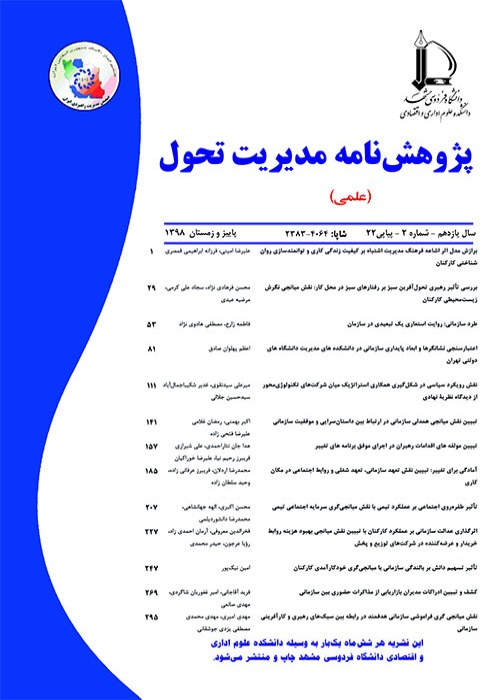Investigating the Effect of Ambidextrous Leadership on Employees’ Silence Mediated by Psychological Empowerment and Social Capital
One of the most important challenges of complicated environments for organizations is to make a balance between discovering and innovative activities called ambidexterity. Organizational ambidexterity has a positive relationship with organizational growth, technical innovation, and financial performance. Generally, those managers who have failed in implementing ambidexterity seem to be unable to utilize their capacity and provide needed resources. Of most important affecting factors, one can refer to domination of organizational silence and the lack of employees’ participation in decision-making processes. Nowadays, leading is considered as the most important role of managers, and organizations seek those managers of having ability to lead as well as integrate different organizational activities, coordinate subsidiary units, and control deviances. Therefore, studying and utilizing the ambidextrous leadership style is of special importance. Despite the importance of ambidextrous leadership in achieving organizational goals, no study has yet investigated its increasing effect on employees’ silence and the mediation role of psychological empowerment and social capital. Therefore, the current research was aimed to study the effect of ambidextrous leadership on employees’ silence considering the mediation of psychological empowerment and social capital in Pars Oil Company.
THEORETICAL FRAMEWORK:
Ambidexterity is the ability to simultaneously utilizing the activities of exploration and exploitation and coordinating them in a flexible manner. Ambidextrous leadership is known as the ability to create explorative and exploitative behaviors in employees through providing the possibility of flexible improvement and adjustment of these two behaviors. This leadership style consists of three elements: 1) open leadership behaviors, 2) close leadership behaviors, and 3) the ability to flexible shift between them. Social capital is defined as a set of resources embedded in the relationship between an employee and the organization or those resources which are accessible because of this relationship. Psychological empowerment is defined as a process of increasing employees’ self-efficacy by identifying the situations that cause power instability or loss of power. Finally, employees’ silence is defined as a refusal of stating the reality about the emotional appraisal of the organization to those managers and employees who seem to be capable of change or compensate the situations.
The current research was an applied study in terms of purpose, and in terms of data collection method, it was a descriptive survey. According to Cochran's formula, a total of 132 people were selected as the statistical sample by conducting simple random sampling. The data collection tool was a 52-item questionnaire of having 5-point Likert scales and 133 questionnaires were finally collected. Obtained data were analyzed using structural equation modeling in SmartPLS software.
Research findings showed that ambidextrous leadership had a positive and significant effect on psychological empowerment. In this regard, it can be said that, by providing freedom for employees to do things and providing them with feedback in the case of problems, the ambidextrous leadership style can improve employees’ behaviors and increase their capabilities. The decreasing effect of psychological empowerment on employee silence was not confirmed. The reason for this insignificance may be the absence of other intervening variables. On the other hand, ambidextrous leadership significantly affected the social capital and social capital reduced the employees’ silence. Therefore, social capital creates a common language for emotional relationships between employees, in which they can easily express their opinions and suggestions and are less inclined to remain silent.
CONCLUSIONS & SUGGESTIONS:
According to research findings, the understudy organization should focus on improving the leadership ability of managers in different organizational levels by approaching the ambidextrous leadership style. Furthermore, future researches are suggested to study a bigger statistical population and consider moderator variables (such as age, gender, education, and organizational climate and culture) or mediator variables (such as job satisfaction, commitment, and motivation) that have the potential to affect the ambidextrous leadership-psychological empowerment relationship.
- حق عضویت دریافتی صرف حمایت از نشریات عضو و نگهداری، تکمیل و توسعه مگیران میشود.
- پرداخت حق اشتراک و دانلود مقالات اجازه بازنشر آن در سایر رسانههای چاپی و دیجیتال را به کاربر نمیدهد.


